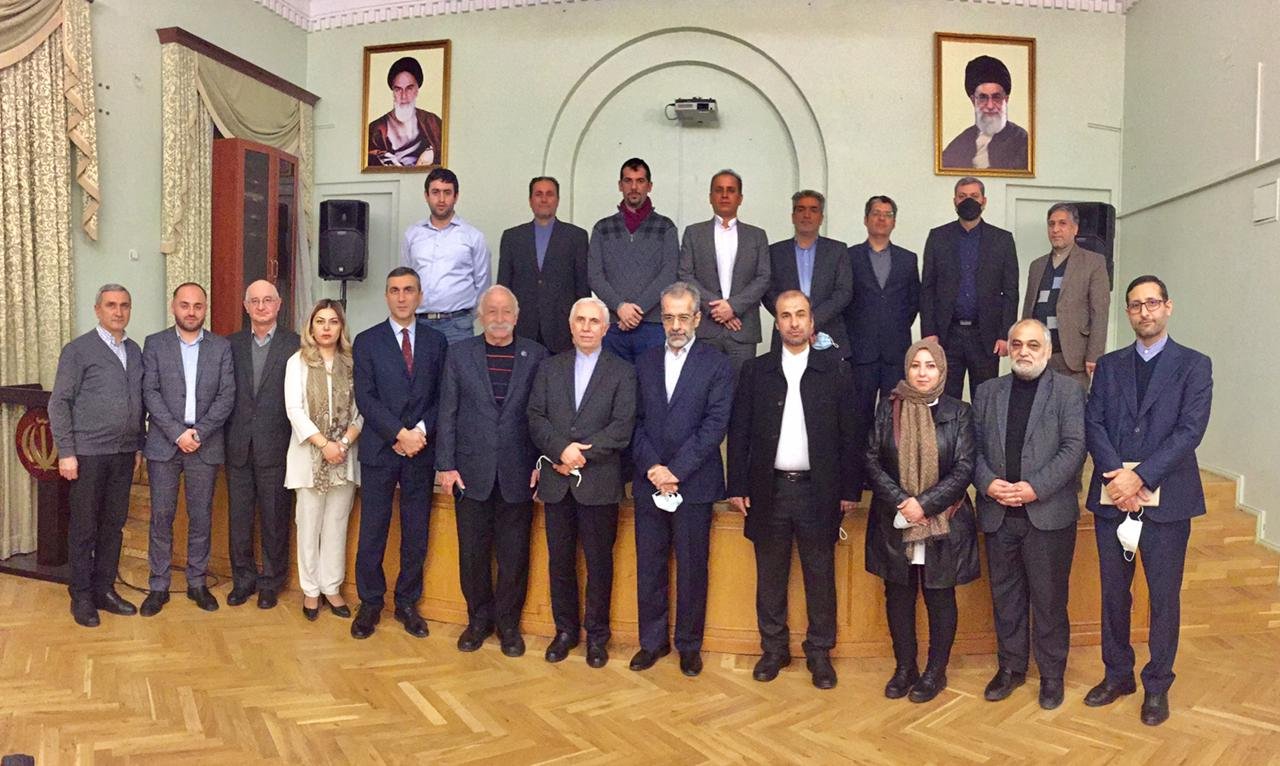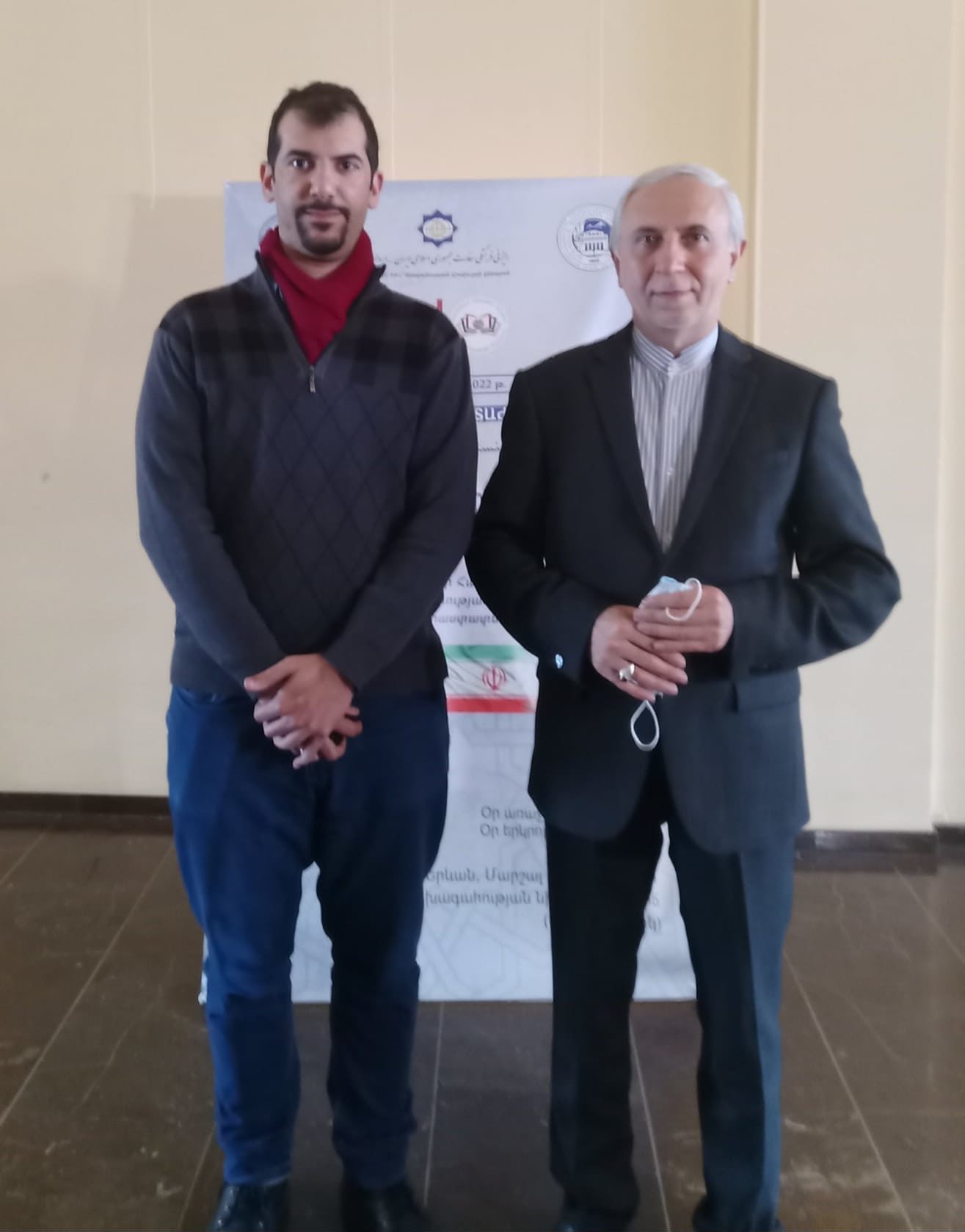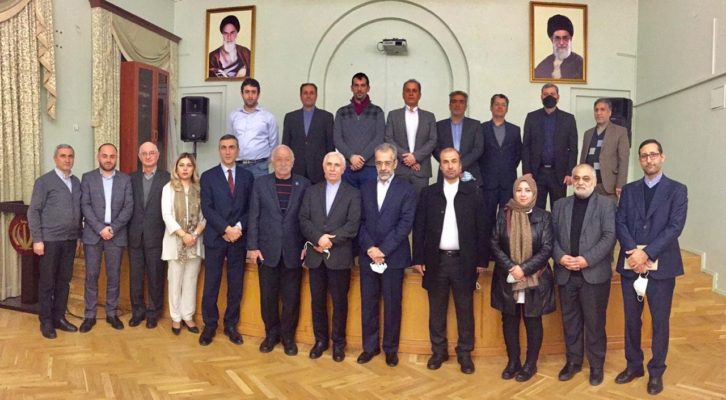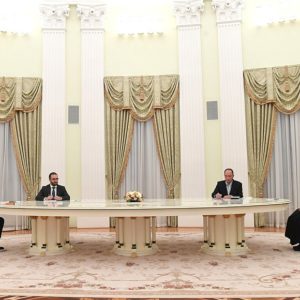
Weekly columnist Yeghia Tashjian pictured with Iranian diplomats, conference organizers and participants at the Embassy of the Islamic Republic of Iran in Yerevan
The Iranian Studies Department of the Oriental Studies of the Armenian National Academy of Sciences, together with the Iranian Cultural Center of the Embassy of Islamic Republic of Iran at Yerevan and Yerevan State University, organized a two-day international conference from February 9-10, 2022 titled “Armenia-Iran Historical Past and Present” dedicated to the establishment of diplomatic relations between both countries. There were more than 20 speakers, diplomats and scholars (Armenians and Iranians), and I was one of them. Iranian-Armenian MPs Robert Beglarian and Ara Shaverdian were also in attendance.
The conference aimed to highlight the history of Armenian-Iranian relations, ranging from political and cultural to economic relations and came up with recommendations to push this relation to different levels. The Iranian Ambassador Extraordinary and Plenipotentiary to Armenia H.E., Mr. Abbas Badakhshan Zohouri in his opening speech for the conference highlighted the geostrategic importance of the Iran-Armenia border; the decision of the Iranian government to open a consulate in Kaban, Syunik; the geopolitical significance of the North-South Transport Corridor; and increasing the trade turnover between both countries to $1 billion.

Weekly columnist Yeghia Tashjian with the Iranian Ambassador Extraordinary and Plenipotentiary to Armenia H.E. Mr. Abbas Badakhshan Zohouri
The following topics were addressed:
Armenian scholars pointed to the civilizational relations between both states, the importance of preserving the current border, the Pan-Turkic threats and Iran’s passive diplomacy during the 2020 Artsakh war. They also expressed concerns regarding the threat of the “Zangezur Corridor” and Azerbaijan’s territorial claims on Armenia.
Iranian scholars pointed out that the 2020 war on Artsakh was not just a war against Armenia, but also Iran. They hinted that by establishing a “Zangezur Corridor,” Turkey-Azerbaijan-Israel are trying to cut Iran’s alternative routes to Europe and Russia. They stressed the importance of the North-South Corridor for both countries, the increase of trade turnover to more than $1 billion and negotiations regarding the free economic zone in Meghri.
Interestingly, none touched on possible military cooperation between both countries.
My Recommendations for the Strengthening of Armenia-Iran Relations
In my concluding speech during the conference, I came up with the following recommendations:
If in the future, Iran joins the Eurasian Economic Union (EAEU), it would have better access to Eurasian, Russian and European markets. This accession would also provide EAEU member states with increased access to the Persian Gulf and increase trade and give stronger impetus and incentive for both sides (Iran and other EAEU members) to pursue common interests in third-party states like in the Levant. So Russia and Iran would have stronger cooperation in the Levant and other regions. Hence, they will work to protect their shared economic interests. Therefore, with the unblocking of regional trade routes, in the long run, Armenia would have access to the Levantine markets and reach the Eastern Mediterranean by rail. Iran should facilitate this project so that Armenia would have access to the seas through Iran and not Turkey.
Both Armenia and Iran could launch rapid joint cooperation through joint venture plans and also through Iran’s investments in Armenia’s highways, especially from the Norduz border crossing to Yerevan in order to widen the capacity of the North-South Corridor. From the Iranian perspective, this would widen not only Armenian-Iranian and regional trade, but also promote Iran’s geo-economic interests in Armenia. Such steps may further attract Indian, Chinese and European investments, which would empower Armenia’s security and stability.
Both Armenia and Iran can also have military cooperation for the sake of regional stability and to ensure that geopolitical borders of regional countries will remain stable and unharmed, especially in Armenia, and to ensure that states like Israel and the US will not try to make a scapegoat of Armenia and weaken Armenia for the sake of their plans in the Caucasus. For this reason, an intelligence cooperation center should be created both in Armenia and Iran where both sides can share, analyze and assess regional threats and terror activities that may expose a threat to both countries and regional securities. To facilitate this process, direct communication channels must be established between the security service institutions of both countries. The target of this initiative should be pan-Turkic and Jihadi terrorist groups,
Opening an Iranian consulate in Syunik is the right step; however, a military coordinator/attaché is needed to analyze the military developments on the border and directly report to Tehran. The opening of the consulate will pave the way for other states to take similar steps and preserve Armenia’s sovereignty with international backing on Syunik.
Communication needs to be enhanced between Armenia and the Diaspora communities in Iran, Iraq, Syria and Lebanon in order to compare and assess Iranian intentions and policies in the Middle East and South Caucasus. These communities can act as secondary embassies to facilitate communication and information sharing between different Iranian and pro-Iranian organizations and the Republic of Armenia. For these reasons, having strong communities in Lebanon and Syria is in the interest of both Armenia and Iran.
After our conference, the Iranian ambassador invited us for a reception at his embassy hall. During a three-hour meeting, in a positive atmosphere, we discussed with the Iranian ambassador and the diplomats about the current challenges and the future of bilateral ties between both countries, geopolitical concerns and threats, and provided suggestions.
Conclusion and Reflection
From this conference and meeting with Iranian diplomats and scholars, I have come to the following conclusion.
- Armenia cannot expect more from Iran. Iran has done its share and now expects Yerevan to positively respond. Iran will never militarily intervene in any possible future border crisis between Armenia and Azerbaijan. What Iran can do is to use some hard power to send messages (military exercises, redeployment of forces in the north). Iran cannot alienate and antagonize its large Iranian-Azeri community which is fully integrated into the Iranian society.
- Iran is satisfied with the current status quo (even though it acknowledges that it has so many gaps), as long Russia doesn’t lose its sphere of influence in the Caucasus. For the time being, Iran cannot alone compete with the rising Turkish influence.
- Iran supports peace and economic growth in the region. The Iranian economy needs markets to export its products and modernize its industry. The conflict between Armenia and Azerbaijan was, to some extent, an obstacle to push for trade activities in the region. Now that both sides are engaging in “dialogue” through Russia, Iran is pushing its geo-economic ambitions forward.
- The North-South Transport Corridor is crucial for Iran. Iran proposed many ideas for Armenia, but is still waiting for a response from Armenian authorities.
- Armenia, with its Christian cultural heritage, is seen as a successful model for the Iranians to provide a civilizational dialogue and Christian-Islamic harmony and a role model that Iran can engage in similar models with other Christian countries in the world, namely the West.
- Armenia and Iran have done so little to strengthen their cultural, trade, and political ties.
- For now, military-technological (arms industry) cooperation is out of the question.
The article was originally published in the Armenian Weekly, on 24/2/2022.
Yeghia Tashjian is a regional analyst and researcher. He has graduated from the American University of Beirut in Public Policy and International Affairs. He pursued his BA at Haigazian University in political science in 2013. In 2010, he founded the New Eastern Politics forum/blog. He was a research assistant at the Armenian Diaspora Research Center at Haigazian University. Currently, he is the regional officer of Women in War, a gender-based think tank. He has participated in international conferences in Frankfurt, Vienna, Uppsala, New Delhi and Yerevan. He has presented various topics from minority rights to regional security issues. His thesis topic was on China’s geopolitical and energy security interests in Iran and the Persian Gulf. He is a contributor to various local and regional newspapers, a columnist in the Armenian Weekly and a presenter of the “Turkey Today” program for Radio Voice of Van. Recently he has been appointed as associate fellow at the Issam Fares Institute for Public Policy and International Affairs at the American University of Beirut and Middle East-South Caucasus expert in the European Geopolitical Forum.







